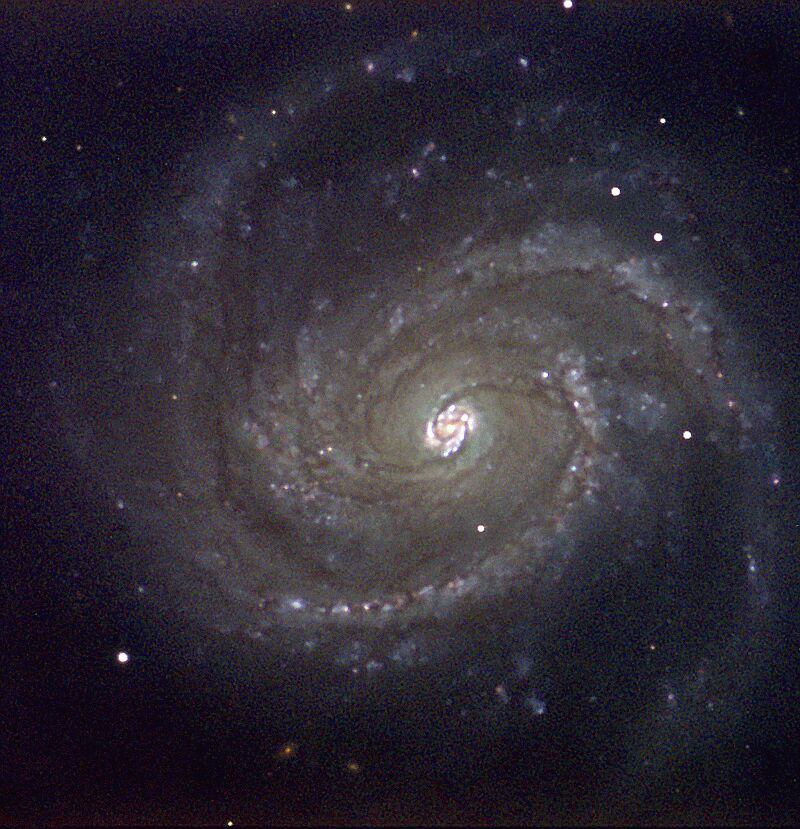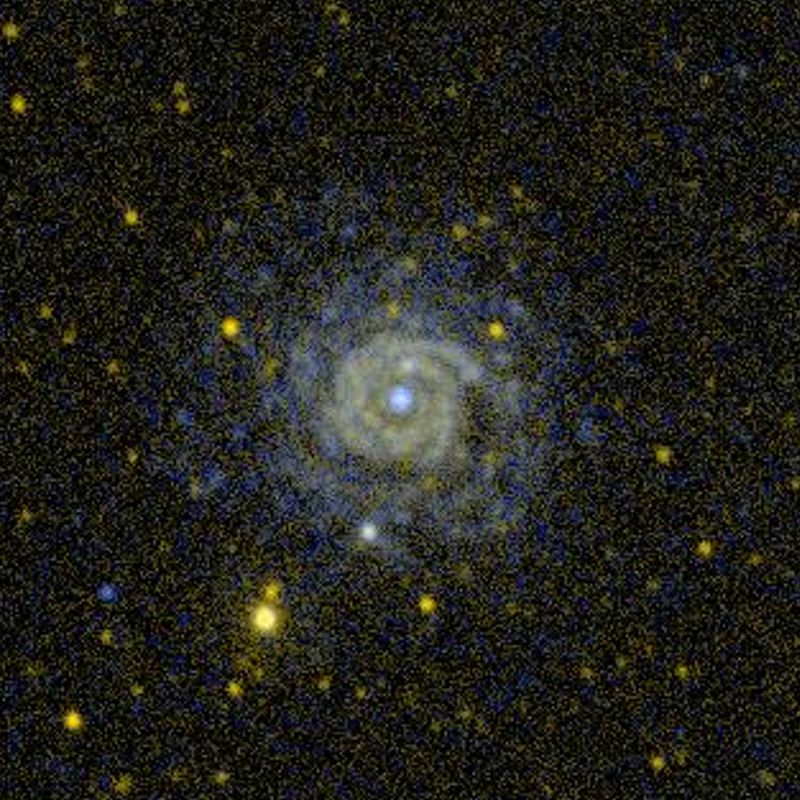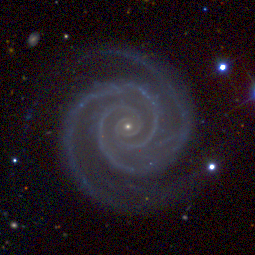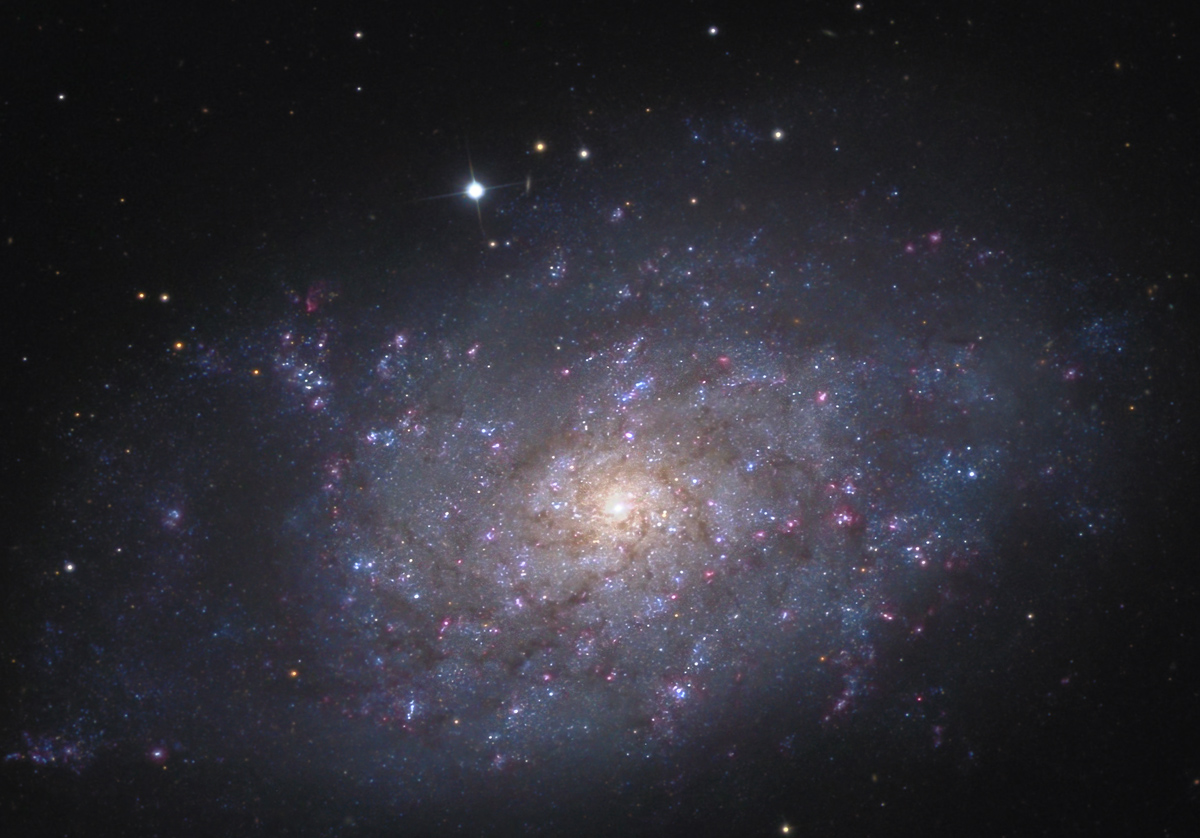Page 1 of 2
APOD: NGC 6814: Grand Design Spiral Galaxy... (2016 Jun 21)
Posted: Tue Jun 21, 2016 4:11 am
by APOD Robot
 NGC 6814: Grand Design Spiral Galaxy from Hubble
Explanation:
NGC 6814: Grand Design Spiral Galaxy from Hubble
Explanation: In the center of this serene stellar swirl is likely a harrowing black-hole beast. The surrounding swirl sweeps around billions of stars which are highlighted by the brightest and bluest. The breadth and beauty of the display give the swirl the designation of a
grand design spiral galaxy. The central beast shows evidence that it is a supermassive
black hole about 10 million times the mass of
our Sun. This ferocious creature
devours stars and gas and is surrounded by a spinning moat of hot plasma that
emits blasts of
X-rays. The central violent activity gives it the designation of a
Seyfert galaxy. Together,
this beauty and beast are cataloged as NGC 6814 and have been
appearing together toward the constellation of the Eagle (
Aquila) for roughly the past billion years.
[/b]
Re: APOD: NGC 6814: Grand Design Spiral Galaxy... (2016 Jun 21)
Posted: Tue Jun 21, 2016 4:14 am
by ShaileshS
Is this galaxy rotating clockwise or counter clockwise ? I read that scientist expect half the galaxies to be of each type but are there any signs or indications based on observations and studies done of so many galaxies by which we can say if this is spinning one way or the other ? Thanks in advance to all who respond.
Re: APOD: NGC 6814: Grand Design Spiral Galaxy... (2016 Jun 21)
Posted: Tue Jun 21, 2016 5:21 am
by Chris Peterson
ShaileshS wrote:Is this galaxy rotating clockwise or counter clockwise ? I read that scientist expect half the galaxies to be of each type but are there any signs or indications based on observations and studies done of so many galaxies by which we can say if this is spinning one way or the other ? Thanks in advance to all who respond.
Nearly all spiral galaxies rotate such that their arms are trailing. A few appear to rotate with their arms leading- probably because of past interactions with other galaxies. Of course, "clockwise" and "counterclockwise" are meaningless in any absolute sense. But from our perspective, we see galaxies rotating both directions, with close to a 50/50 split, as would be expected. However, a large survey a few years back suggested that their might be a small imbalance. If so, the cause remains uncertain. This one, from our perspective and in the coordinate frame of the image is likely rotating counterclockwise.
Re: APOD: NGC 6814: Grand Design Spiral Galaxy... (2016 Jun 21)
Posted: Tue Jun 21, 2016 5:32 am
by ShaileshS
Most visualizations I have seen of event horizon, the matter is collapsing in in the black hole and that would make sense when the galaxies are spinning in (counter clockwise, arms rotating inwards towards the black hole). But if half the galaxies are expected/assumed to be rotating out (spinning arms going out as if thrown away from the black hole) then in that case, since spinning is happening away from the black hole, there won't be any matter falling in the block hole and if so, it may starve resulting in <???> ?
Re: APOD: NGC 6814: Grand Design Spiral Galaxy... (2016 Jun 21)
Posted: Tue Jun 21, 2016 5:37 am
by Chris Peterson
ShaileshS wrote:Most visualizations I have seen of event horizon, the matter is collapsing in in the black hole and that would make sense when the galaxies are spinning in (counter clockwise, arms rotating inwards towards the black hole). But if half the galaxies are expected/assumed to be rotating out (spinning arms going out as if thrown away from the black hole) then in that case, since spinning is happening away from the black hole, there won't be any matter falling in the block hole and if so, it may starve resulting in <???> ?
The black hole in the center of most galaxies has almost no impact on the galaxies, nor do most receive much matter from their galaxies (except for active galaxies, which are in a transient phase). Nothing you see in a spiral galaxy is moving either inward or outward. The stars are in substantially circular orbits, and nothing would change if their central black holes disappeared.
Re: APOD: NGC 6814: Grand Design Spiral Galaxy... (2016 Jun 21)
Posted: Tue Jun 21, 2016 6:12 am
by Ann
Chris Peterson wrote:ShaileshS wrote:Most visualizations I have seen of event horizon, the matter is collapsing in in the black hole and that would make sense when the galaxies are spinning in (counter clockwise, arms rotating inwards towards the black hole). But if half the galaxies are expected/assumed to be rotating out (spinning arms going out as if thrown away from the black hole) then in that case, since spinning is happening away from the black hole, there won't be any matter falling in the block hole and if so, it may starve resulting in <???> ?
The black hole in the center of most galaxies has almost no impact on the galaxies, nor do most receive much matter from their galaxies (except for active galaxies, which are in a transient phase). Nothing you see in a spiral galaxy is moving either inward or outward. The stars are in substantially circular orbits, and nothing would change if their central black holes disappeared.
Does Chris' answer seem strange to you? Then compare the central black hole inside a galaxy with the Sun in our solar system. There is one huge, huge difference between the Sun in our solar system and the central black hole inside a galaxy, and that is that
our Sun holds 99.8% of the mass of our solar system(!), whereas the central black holes of most galaxies hold something like 0.025% of the stellar mass of their host galaxies, if I understood the abstract of
this paper correctly. In any case, the mass of the black hole is extremely tiny compared with the mass of the entire galaxy.
That is why it wouldn't matter to the galaxy and its constituent stars if the black hole disappeared. To our solar system, by contrast, it would be utter catastrophe if our Sun disappeared.
But now that our Sun is healthy and very much present in our solar system, the planets don't fall into the Sun. They just keep orbiting it. And if our Sun, by some magical means, suddenly turned itself into a 1-solar-mass black hole, the planets in our solar system would keep orbiting this black hole as if nothing had happened. They wouldn't fall into the black hole, any more than they fall into the Sun.
And if the planets of our solar system orbited "the other way", that wouldn't make any difference, either. The planets would still just keep orbiting the Sun without falling into it - at least the planets that have achieved stable more or less circular orbits, like the Earth, for example.
Ann
Re: APOD: NGC 6814: Grand Design Spiral Galaxy... (2016 Jun 21)
Posted: Tue Jun 21, 2016 7:11 am
by Ann
When I searched for other pictures of NGC 6814 to compare with today's APOD, I came across
this page whose caption made this claim:
As NGC 6814 is a very active galaxy, many regions of ionized gas are studded along its spiral arms.
In these large clouds of gas, a burst of star formation has recently taken place, forging the brilliant blue stars that are visible scattered throughout the galaxy.
Uh-uh. No. There has been no recent burst of star formation in NGC 6814. The beautifully regular shape of the arms of NGC 6814 is enough to tell us that there has been no sudden large-scale star formation there within the last half a billion years or so.
M100. Photo: ING Archive and Nik Szymanek.
The galaxy at left, M99, is not classified as a starburst galaxy, but it has a star formation rate
three times larger than typical galaxies of the same Hubble class. We can see that it is rather irregularly shaped, and that it is full of bright clumps of star clusters and nebulas. Most of the star formation is located in the arms.
The galaxy at right, M100, is indeed classified as
a starburst galaxy. But as you can see in the picture at right, the starburst is located in the small central ring surrounding the nucleus. In the rest of the galaxy, the rate of star formation is actually lower than in most galaxies of the same Hubble class.
NGC 6814, by contrast, has no bright ring around its nucleus and no discrete bright clumps in its arms. There is clearly little star formation in NGC 6814. But the low contrast GALEX ultraviolet image at right shows that the center of NGC 6814 is bright in ultraviolet light. That is almost certainly because NGC 6814 is a Seyfert galaxy with an active center. It has an accretion disk feeding its central black hole, and this accretion disk emits ultraviolet light.
Ann
Re: APOD: NGC 6814: Grand Design Spiral Galaxy... (2016 Jun 21)
Posted: Tue Jun 21, 2016 12:26 pm
by heehaw
"Of course, "clockwise" and "counterclockwise" are meaningless in any absolute sense"
http://www.cafepress.com/+backwards+clocks
Re: APOD: NGC 6814: Grand Design Spiral Galaxy... (2016 Jun 21)
Posted: Tue Jun 21, 2016 12:49 pm
by Dad is watching
In a spiral galaxy, to be actually considered an 'arm', how far around the galaxy does a trail of stars and matter have to extend?
Re: APOD: NGC 6814: Grand Design Spiral Galaxy... (2016 Jun 21)
Posted: Tue Jun 21, 2016 12:58 pm
by neufer
https://en.wikipedia.org/wiki/Spiral_galaxy#Alignment_of_spin_axis_with_cosmic_voids wrote:
<<Recent results suggest that the orientation of the spin axis of spiral galaxies is not a chance result, but instead they are preferentially aligned along the surface of cosmic voids. That is, spiral galaxies tend to be oriented at a high angle of inclination relative to the large-scale structure of the surroundings.
They have been described as lining up like "beads on a string," with their axis of rotation following the filaments around the edges of the voids.>>
https://en.wikipedia.org/wiki/Void_(astronomy) wrote:
<<Cosmic voids are the vast empty spaces between filaments (the largest-scale structures in the Universe), which contain very few or no galaxies. Voids typically have a diameter of 10 to 100 megaparsecs; particularly large voids, defined by the absence of rich superclusters, are sometimes called supervoids. They have less than one-tenth of the average density of matter abundance that is considered typical for the observable Universe.
Voids are believed to have been formed by baryon acoustic oscillations in the Big Bang, collapses of mass followed by implosions of the compressed baryonic matter. Starting from initially small anisotropies from quantum fluctuations in the early Universe, the anisotropies grew larger in scale over time. Regions of higher density collapsed more rapidly under gravity, eventually resulting in the large-scale, foam-like structure or “cosmic web” of voids and galaxy filaments seen today. Voids located in high-density environments are smaller than voids situated in low-density spaces of the universe.
Voids appear to correlate with the observed temperature of the cosmic microwave background (CMB) because of the Sachs–Wolfe effect. Colder regions correlate with voids and hotter regions correlate with filaments because of gravitational redshifting. As the
Sachs–Wolfe effect is only significant if the Universe is dominated by radiation or dark energy, the existence of voids is significant in providing physical evidence for dark energy.>>
Re: APOD: NGC 6814: Grand Design Spiral Galaxy... (2016 Jun 21)
Posted: Tue Jun 21, 2016 1:21 pm
by neufer
Dad is watching wrote:
In a spiral galaxy, to be actually considered an 'arm', how far around the galaxy does a trail of stars and matter have to extend?
That sort of depends if you, yourself, believe that you live in the Orion–Cygnus Arm or in the Local/Orion Spur:
https://en.wikipedia.org/wiki/Orion_Arm wrote:
<<
The Orion Arm is a minor spiral arm of the Milky Way some 3,500 light-years across and approximately 10,000 light-years in length. The Solar System, including the Earth, lies within the Orion Arm. It is also referred to by its full name, the Orion–Cygnus Arm, as well as Local Arm, Orion Bridge, Local Spur and Orion Spur.
The Orion Arm is named for the Orion constellation, which is one of the most prominent constellations of Northern Hemisphere winter (Southern Hemisphere summer). Some of the brightest stars and most famous celestial objects of this constellation (Betelgeuse, Rigel, the stars of Orion's Belt, the Orion Nebula) are located within the Orion Arm, as shown on the interactive map below.
The Orion Arm is located between the Carina–Sagittarius Arm (toward the Galactic Center) and the Perseus Arm (toward the outside Universe), the latter one of the two major arms of the Milky Way. Long thought to be a minor structure, a "spur" between the two longer adjacent arms Perseus and Carina-Sagittarius, evidence was presented in mid 2013 that it might be a branch of the Perseus Arm, or possibly an independent arm segment itself.
Within the Orion Arm, the Solar System, including Earth, is located close to the inner rim in the Local Bubble, about halfway along the Orion Arm's length, approximately 8,000 parsecs (26,000 light-years) from the Galactic Center.>>
Re: APOD: NGC 6814: Grand Design Spiral Galaxy... (2016 Jun 21)
Posted: Tue Jun 21, 2016 2:56 pm
by Fred the Cat
Is the name for such a galaxy a euphemism?
Grand design is a philosophically loaded gun. Taken individually the words might portray an impressive structure but put together their meaning has been very divisive.
Hawking and Mlodinow attempt to use their similarly-titled
book to take us through the history of scientific learning into
a universe of 10 dimensions and M-theory. The "
grand" part is obvious but the "design" part of the name implies much
more.

Re: APOD: NGC 6814: Grand Design Spiral Galaxy... (2016 Jun 21)
Posted: Tue Jun 21, 2016 3:06 pm
by zendae
Is there an artist's depiction of what the Galactic Center of a typical spiral galaxy would look like if a camera were, say, a couple of light years from it? Not so much the very center, but the overall hazy glow of stars that are a few hundred to a couple thousand light years across?
Re: APOD: NGC 6814: Grand Design Spiral Galaxy... (2016 Jun 21)
Posted: Tue Jun 21, 2016 3:34 pm
by Ann
Dad is watching wrote:In a spiral galaxy, to be actually considered an 'arm', how far around the galaxy does a trail of stars and matter have to extend?
NGC 2857. Photo:
European Southern Observatory - NASA/IPAC Extragalactic Database
NGC 7793. Photo: Josef Pöpsel.
NGC 2857 has fantastically long arms that extend more than 360
o around the galaxy's center. NGC 2857 is a perfect example of a grand design galaxy with two long elegant arms.
But what about NGC 7793? Its disk appears to be "exploding" with short arms in all directions. Is NGC 7793 a spiral galaxy? Yes, it is classified as an Sd galaxy, the loosest of all spiral galaxies. Are those things arm? I guess they are.
Ann
Re: Favorite APOD
Posted: Tue Jun 21, 2016 4:23 pm
by nycpaull
Is there an animation that would simulate/demonstrate the full life of a galaxy from formation to end? Would a possible end of a galaxy look like water flowing down a drain as its black hole devours it?
Re: Favorite APOD
Posted: Tue Jun 21, 2016 5:06 pm
by Chris Peterson
nycpaull wrote:Is there an animation that would simulate/demonstrate the full life of a galaxy from formation to end? Would a possible end of a galaxy look like water flowing down a drain as its black hole devours it?
There are numerical simulations of galaxy evolution. However, they are not consumed by their central black holes. They are disrupted and dispersed by other galaxies, and eventually lose their gas and dust, becoming stable. If they still have their black hole, it will simply be orbited by all the other stars.
Re: APOD: NGC 6814: Grand Design Spiral Galaxy... (2016 Jun 21)
Posted: Tue Jun 21, 2016 5:51 pm
by Boomer12k
Wow... just awesome...
Look into my eye... you are getting SLEEEPY....SLEEEEEEEPIER....SLLLEEEEEEEEEPPPPIIIER......
zzzzzzzzzzz
:---[===] *
Re: APOD: NGC 6814: Grand Design Spiral Galaxy... (2016 Jun 21)
Posted: Tue Jun 21, 2016 5:54 pm
by Boomer12k
Ann wrote:Dad is watching wrote:In a spiral galaxy, to be actually considered an 'arm', how far around the galaxy does a trail of stars and matter have to extend?
NGC 2857. Photo:
European Southern Observatory - NASA/IPAC Extragalactic Database
NGC 7793. Photo: Josef Pöpsel.
Ann, I am thinking with NGC 7793, there were many, many, many, small mergers... and it is still in a state of "settling"....
:---[===] *
NGC 2857 has fantastically long arms that extend more than 360
o around the galaxy's center. NGC 2857 is a perfect example of a grand design galaxy with two long elegant arms.
But what about NGC 7793? Its disk appears to be "exploding" with short arms in all directions. Is NGC 7793 a spiral galaxy? Yes, it is classified as an Sd galaxy, the loosest of all spiral galaxies. Are those things arm? I guess they are.
Ann
Re: APOD: NGC 6814: Grand Design Spiral Galaxy... (2016 Jun 21)
Posted: Tue Jun 21, 2016 7:27 pm
by Fred the Cat
I might be put off by the name but the image itself is almost immaculate. I don't have the expertise to begin to understand the magic that goes into processing the Hubble data into what we see today but I do like the outcome. On high resolution the diffraction spikes of the foreground stars are quite unique. I can't say that I have noticed that effect before. And the "eye" of the central nucleus amongst the swirling gas and dust is so finely detailed that I think it's looking back at me.

I could be dreaming Boomer or, possibly, there
is a grand design after all.
It just happens to be Gecks!

Re: APOD: NGC 6814: Grand Design Spiral Galaxy... (2016 Jun 21)
Posted: Tue Jun 21, 2016 7:42 pm
by Chris Peterson
Fred the Cat wrote:Is the name for such a galaxy a euphemism?
Grand design is a philosophically loaded gun. Taken individually the words might portray an impressive structure but put together their meaning has been very divisive.
Hawking and Mlodinow attempt to use their similarly-titled
book to take us through the history of scientific learning into
a universe of 10 dimensions and M-theory. The "
grand" part is obvious but the "design" part of the name implies much
more. :?
You can have a design without a designer.
Re: APOD: NGC 6814: Grand Design Spiral Galaxy... (2016 Jun 21)
Posted: Tue Jun 21, 2016 7:47 pm
by geckzilla
Chris Peterson wrote:Fred the Cat wrote:Is the name for such a galaxy a euphemism?
Grand design is a philosophically loaded gun. Taken individually the words might portray an impressive structure but put together their meaning has been very divisive.
Hawking and Mlodinow attempt to use their similarly-titled
book to take us through the history of scientific learning into
a universe of 10 dimensions and M-theory. The "
grand" part is obvious but the "design" part of the name implies much
more.

You can have a design without a designer.
Especially when you've got a brain capable of seeing designs in purely random data, much less something with structure formed through physical interactions.
Re: APOD: NGC 6814: Grand Design Spiral Galaxy... (2016 Jun 21)
Posted: Wed Jun 22, 2016 3:03 pm
by Evermore
Chris Peterson wrote:ShaileshS wrote:Is this galaxy rotating clockwise or counter clockwise ? I read that scientist expect half the galaxies to be of each type but are there any signs or indications based on observations and studies done of so many galaxies by which we can say if this is spinning one way or the other ? Thanks in advance to all who respond.
Nearly all spiral galaxies rotate such that their arms are trailing. A few appear to rotate with their arms leading- probably because of past interactions with other galaxies. Of course, "clockwise" and "counterclockwise" are meaningless in any absolute sense. But from our perspective, we see galaxies rotating both directions, with close to a 50/50 split, as would be expected. However, a large survey a few years back suggested that their might be a small imbalance. If so, the cause remains uncertain. This one, from our perspective and in the coordinate frame of the image is likely rotating counterclockwise.
Arms trailing or proceeding .. could it be this indicates direction of travel?
Re: APOD: NGC 6814: Grand Design Spiral Galaxy... (2016 Jun 21)
Posted: Wed Jun 22, 2016 3:05 pm
by Evermore
geckzilla wrote:Chris Peterson wrote:Fred the Cat wrote:Is the name for such a galaxy a euphemism?
Grand design is a philosophically loaded gun. Taken individually the words might portray an impressive structure but put together their meaning has been very divisive.
Hawking and Mlodinow attempt to use their similarly-titled
book to take us through the history of scientific learning into
a universe of 10 dimensions and M-theory. The "
grand" part is obvious but the "design" part of the name implies much
more.

You can have a design without a designer.
Especially when you've got a brain capable of seeing designs in purely random data, much less something with structure formed through physical interactions.
Then why do newborn mamals, without any previous instruction or patterning, automatically seek out the nipple?
Re: APOD: NGC 6814: Grand Design Spiral Galaxy... (2016 Jun 21)
Posted: Wed Jun 22, 2016 3:29 pm
by Fred the Cat
Evermore wrote:geckzilla wrote:Chris Peterson wrote:
You can have a design without a designer.
Especially when you've got a brain capable of seeing designs in purely random data, much less something with structure formed through physical interactions.
Then why do newborn mamals, without any previous instruction or patterning, automatically seek out the nipple?
Good question 
Re: APOD: NGC 6814: Grand Design Spiral Galaxy... (2016 Jun 21)
Posted: Wed Jun 22, 2016 6:39 pm
by geckzilla
The same way they automatically breathe. It's not hard! Down the rabbit hole of non-free will, we go.
 NGC 6814: Grand Design Spiral Galaxy from Hubble
NGC 6814: Grand Design Spiral Galaxy from Hubble





